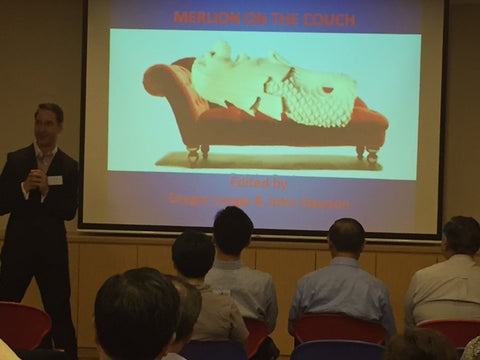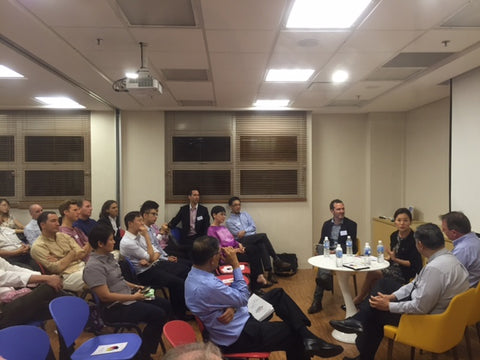Book Launch of Clinical Psychology in Singapore September 22, 2015 13:41
Dr Gregor Lange and Dr John Davison’s book, Clinical Psychology in Singapore: An Asian Casebook, was launched at the Brahm Centre in Ren Ci Hospital, on 17 September 2015.
As an unprecedented look into clinical psychology and its practices in Singapore, the book offers case studies based on Singaporean clients, and sheds light on how psychologists deal with the different cultural and ethical issues encountered in their work here. These case studies encompass a range of mental health problems ranging from pyromania to depression, and span across age groups as well. Notably, the casebook came together with contributions from numerous members of Singapore's psychology community, many of them being present among that evening's audience of academics, practitioners, and members of the general public.
The launch was an occasion packed with as many laughs as there were moments of more sombre reflection – this perhaps being not unlike the ups and downs faced in engaging with clinical psychology in Singapore so far.
Q: What is the state of mental health in Singapore? A: Stateless
Dr Ong Lue Ping, IMH's Principal Clinical Psychologist, kicked off the event with his talk on the state of mental health in Singapore.
His pronouncement was – in Dr Ong’s own words – most “provocative”, for he went on to declare Singapore’s state of mental health as being, in fact, “stateless”. Though this was met with some amusement from the audience, Dr Ong lamented the real dilemma encountered in this. On one hand, psychologists in Singapore hospitals are still expected to “defer” to doctors and psychiatrists. Yet, on the other hand, independent psychologists working outside of this system are often simultaneously seen by the public as being “atas”. Undeterred by this, Dr Ong rounded things up by proposing three factors that had to be attended to equally in clinical psychology – namely accessibility, quality, and affordability – in order to rectify existing flaws in practice.
Merlion on the couch
A streak of joviality was picked up again in Dr Lange’s address. Regaling the audience with how he and Dr Davison had edited Clinical Psychology in Singapore together, Dr Lange sent people up in laughs by joking that one of the more exciting titles actually considered for the casebook was none other than Merlion on the Couch.
Such irreverent humour aside, Dr Lange also spoke about why he and Dr Davison decided to embark on such a book. While teaching psychology at NUS, it was a revelation for the both of them that case studies to be used always took place in the US or other parts of the West. This difference in setting – which could range from the usual Hollywood celebrity gone mad profile to the scenario of a cocaine-taking young adult in downtown LA, Dr Lange explained animatedly – was something that students here frequently could not relate to. Yet, there was a dearth of resources in the local context that could be utilized in class. The need for a casebook designed for Singapore thus arose.
Of paradoxes and paychecks
Next was an expert panel on the future of clinical psychology in Singapore, including Ms Jennifer Teoh, Director and Senior Principal Forensic Psychologist at MSF’s Clinical and Forensic Psychology branch, Dr Simon Collinson from NUS, and Mr Timothy Leo, Director of the Psychological & Correctional Rehabilitation division at Singapore Prison Service.
Intriguingly, Dr Davison asked the panel about a paradox that seems to play out in Singapore - that is, the fact that it is often difficult to involve the client’s family in therapy, despite how Singapore is ‘supposed’ to be a country rooted in collectivism. To this, Ms Teoh shared that the MSF started a functional family therapy scheme a year ago that would enable the whole family to be seen together outside of working hours, thus perhaps resolving the practical complications that contribute to this situation. Dr Collinson further suggested that there has to be an improvement in the training offered in family therapy, so as to better ease families into being engaged throughout the process.
Besides this, Mr Leo also remarked that the biggest challenge for psychologists in the next five years should concern the respect for psychology as a science. Making the timely observation that psychologists like Dr Daniel Chan were involved in the media as commentators on the recent elections here, Mr Leo commented that such screen time should be seen as good opportunities for the discipline, and more psychologists could follow suit to step up to the plate in terms of advocacy.
Finally, closing the discussion on a lighter note, Dr Davison fired a series of quick questions at the panelists, one of these being on whether psychologists in Singapore should be paid more. To which all three panelists chorused in unison: “Yes.”
Clinical Psychology in Singapore: An Asian Casebook is available at NUS Press and Kinokuniya Singapore Main Store. Clinical Psychology in Singapore is a unique resource on the practices and principles of clinical psychologists in Singapore. An ideal complement to abnormal, counselling or clinical psychology courses, it is the textbook for PL3236 Abnormal Psychology at the National University of Singapore and will be a supplementary text for Temasek Polytechnic’s Abnormal Psychology module by April 2016. Please email sebastian_song@nus.edu.sg for all enquiries on textbook adoption and review copies.




